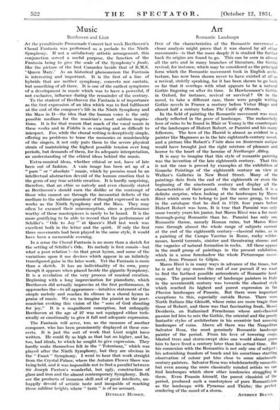Music
Beethoven and Liszt AT the penultimate Promenade Concert last week Beethoven's Choral Fantasia was performed as a prelude to the Ninth Symphony. If not a satisfactory artistic arrangement, this conjunction served a useful purpose, the function of the Fantasia being to give the scale of the Symphony's finale, like the picture of the first Cunarder beside that of R.M.S. 'Queen Mary.' As an historical phenomenon the Fantasia is interesting and important. It is the first of a line of hybrids that are neither symphony, concerto nor cantata, but something of all three. . It is one of the earliest symptoms of a development in music which was to have a powerful, if not exclusive, influence during the remainder of the century.
To the student of Beethoven the Fantasia is of importance as the first expression of an idea which 'was to find fulfilment at the end of the composer's life in the Ninth Symphony and the Mass in D—the idea that the human voice is the only possible medium for the musician's most sublime inspira- tions. It is for that reason that much of the vocal music in these works and in Fidelio is so exacting and so difficult to interpret. For, while the choral writing is deceptively simple, offering no problems to tease the memories or musicianship of the singers, it not only puts them to the severe physical strain of maintaining the highest possible tension over long periods, but demands of them, for its adequate interpretation, an 'understanding of the ethical ideas behind the music.
Extra-musical ideas, whether ethical or not, have of late been out of fashion. A vain image has been set up of a " pure " or " absolute " music, which by premiss must be an intellectual abstraction devoid of the human emotion that is the germ of any true artistic creation. It is hardly surprising, therefore, that an ethic so naively and even clumsily stated as Beethoven's should earn the dislike or the contempt of those who cannot see through the inessential defects of the medium to the sublime grandeur of thought expressed in such works as the Ninth Symphony and the Mass. They may often' be excused their misconception, since a performance worthy of these masterpieces is rarely to be heard. It is the more gratifying to be able to record that the performance of Schiller's "Ode to Joy at Queen's Hall last week was excellent both in the letter and the spirit. If only the first three movements had been played in the same style, it would have been a memorable evening.
In a sense the Choral Fantasia is no more than a sketch for the setting of Schiller's Ode. Its melody is first cousin—but what a poor relation !—to that great hymn, and some of the variations upon it use devices which appear in an infinitely transfigured guise in the later work. Yet the Fantasia is more than a sketch. It has an individuality of its own, puny though it appears when placed beside the gigantic Symphony. It is a revelation of the very process of musical creation. Beginning with a long improvization for pianoforte, which Beethoven did actually improvize at the first performance, it approaches the—to all appearance—intuitive statement of the simple melody and reaches its climax in a choral hymn in praise of music. We are to imagine the pianist as the poet- musician evoking this vision of the "sons of God shouting for joy." It is a magnificent conception, but unhappily Beethoven at the age of 37 was not equipped either tech- nically or emotionally to give it full and adequate expression.
The Fantasia will serve, too, as the measure of another composer, who has been prominently displayed at these con- certs. It is just the sort of work that Liszt might have written. He could fly as high as that but no higher, and he, too, had ideals, to which he sought to give expression. They hardly make themselves felt in the " Totentanz," which was played after the Ninth Symphony, but they are obvious in the " Faust " Symphony. I went to hear that work straight from the Crystal Palace, where the Autumn Flower Show was being held, and it was impossible not to find a parallel !between Sir Joseph Paxton's wonderful, but ugly, construction of glass and iron and the almost contemporary Symphony. Both are the products of immense skill and of great intellects, un- happily devoid of artistic taste and incapable of reaching those sublime heights where " taste " is of no account. . .
DYNELEY HUSSEY.














































 Previous page
Previous page